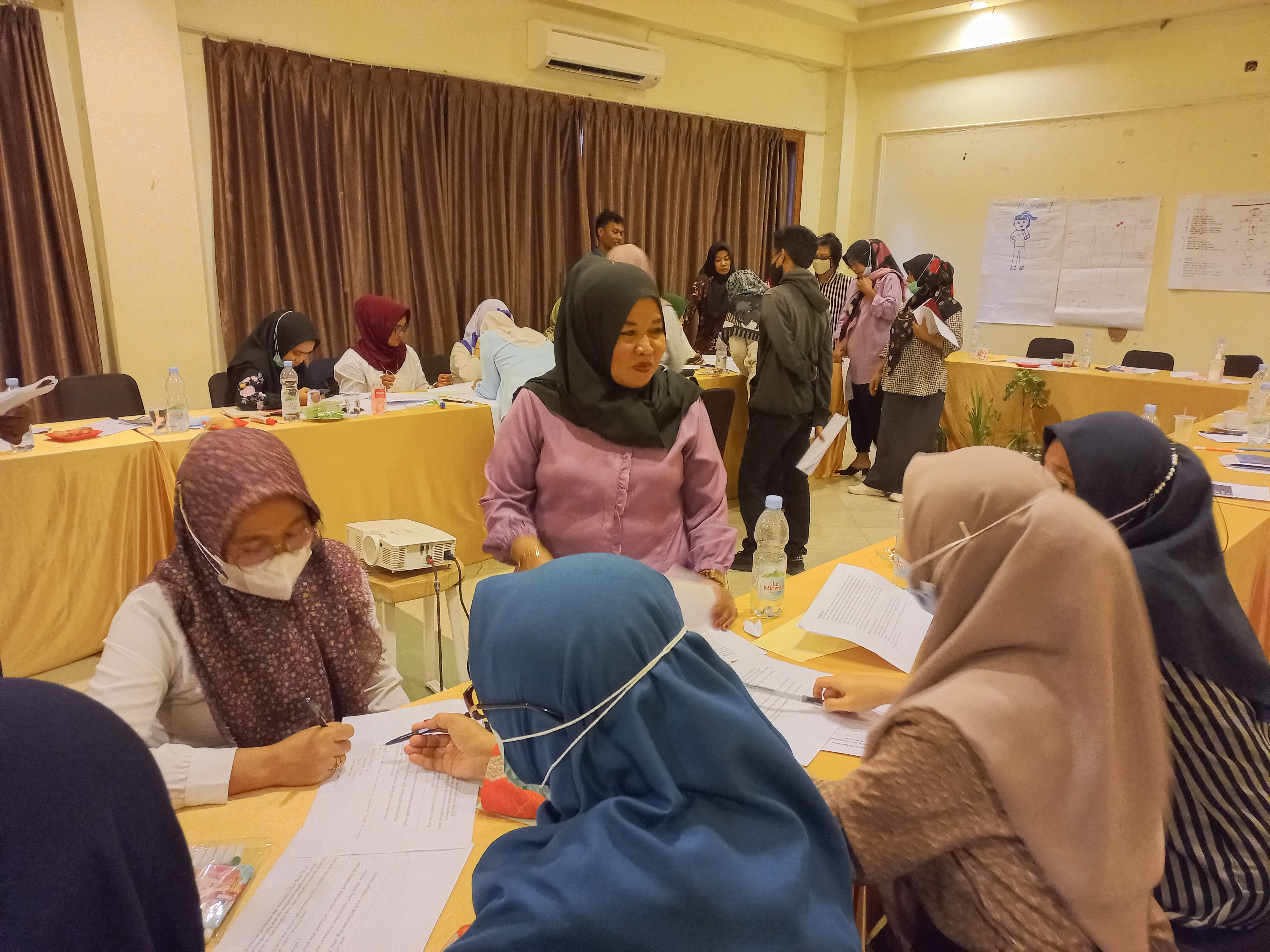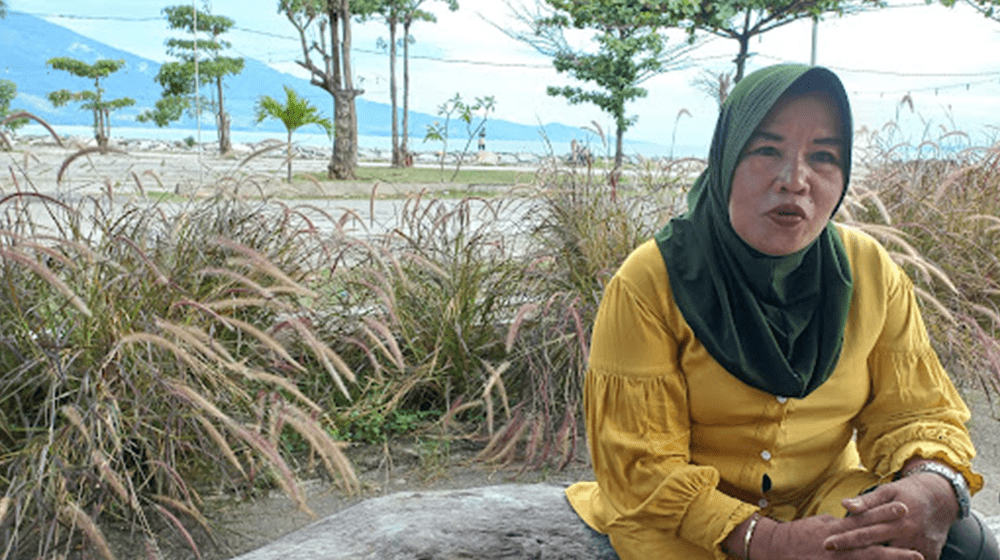“I am happy to help other women to be empowered and to be able to find the right information to get help and safety,” said Faizah, a woman community volunteer from Bulubete village, Sigi, Central Sulawesi.
Faizah was one of the active participants of the of training programme to strengthen community response for the prevention of gender-based violence (GBV) in Palu and Sigi, Central Sulawesi, that the United Nations for Populations Fund (UNFPA) and Ministry of Women’s Empowerment and Child Protection (KPPPA) conducted in collaboration with Kelompok Perjuangan Kesetaraan Perempuan Sulawesi Tengah (Central Sulawesi Group for Women’s Equality/KPKP-ST), a non-government organization (NGO) working on women’s rights and protection from violence, in 2019.
She is now an active community volunteer of KPKP-ST and a member of a task force in Bulubete village who works tirelessly to provide care support to the survivors of gender-based violence in Bulubete Village, Sigi district.
This year, she participated in the training on the reproductive health behavior change communication for the prevention of child marriage by Yayasan Kesehatan Perempuan (Women’s Health Foundation/YKP) in 2022, in collaboration with KPPPA and UNFPA. Supported by the Global Affairs Canada, this training is part of a joint initiative with UNICEF entitled the Better Sexual and Reproductive Health and Rights for All in Indonesia (BERANI).
Empowering women and girls in her community
Just after the earthquake, tsunami, and liquefaction hit Central Sulawesi in 2018, women and girls faced relentless insecurity in dire conditions. In overcrowded shelters, women and girls lived next to men and boys that they are not related to, often without secure closures between the tents.
As a response to the disaster, UNFPA Indonesia in collaboration with the Government of Indonesia’s humanitarian assistance joined hands to ensure live-saving sexual and reproductive health services reach women and girls. In collaboration with KPPPA, Palu District Office of Women Empowerment and Child Protection (DP3A), and local NGOs like KPKP-ST and Libu Perempuan, UNFPA Indonesia set up women-friendly tents in 12 areas in Palu, Sigi and Donggala. In collaboration with partners, UNFPA also established women and youth-friendly spaces where women and girls could access psychosocial support for trauma recovery, as well as reproductive health and GBV services and other essential information.
Soraya Sultan, the Head of KPKP-ST, highlighted the importance of women-friendly tents and spaces, especially during emergencies and disasters. “Various forms of gender-based violence often take place even in post-disaster situations. Just going to the bathroom is risky for women and girls living in tents. We received reports on sexual violence cases (during the Central Sulawesi disaster),” Soraya said. “Women-friendly tents made an important difference in ensuring the safety of women and providing support for the victims of gender-based violence by delivering psychosocial service and trauma healing when services were disrupted,” she said.
Safe spaces for women and services for GBV survivors must remain even after the disaster, according to Soraya. It has also led to KPKP-ST’s initiative to equip and strengthen capacities of volunteers to support the handling and accompaniment of GBV victims. With UNFPA’s support, KPKP-ST trained more than 60 volunteers to become supporters and case managers for GBV survivors in 2019.
Faizah, as a community volunteer, participated in the training. Driven by her spirit to help and empower GBV survivors and to prevent child marriage among girls in her village, Faizah started to feel the calling after witnessing the impact of 2018 earthquake and tsunami in Central Sulawesi on women and girls. That was what compelled Faizah to join as a volunteer in the women-friendly tent, and this is where her journey began.
Women-friendly space: a safe space for women and girls to seek care and protection
As a community volunteer, Faizah’s active role in providing care and support for GBV survivors has not stopped even after the emergency situation ended. Today, she runs a women-friendly space in Bulubete village where she facilitates educational sessions for women, adolescents, and men, as well as providing care and support for GBV survivors to access help and safety.
“The women-friendly space is a safe space for women from Bulubete and surrounding villages to gather and share their stories. Women and girls gather to discuss important topics such as sexual and reproductive health and even just to share how their days went,” Faizah said. “GBV survivors also come to the women-friendly space to seek help and support… This is how I can reach more women and provide support through provision of safe space for GBV survivors,” she continued. This women-friendly space also serves as a place where youth integrated center (Posyandu Remaja) activities are conducted.
In her village, Faizah has been known as the guardian to survivors who seek support when they face GBV, such as intimate partner violence. She has also developed close relationships with GBV frontliners in Bulubete village, including those from DP3A and law enforcement, making her a skilled and knowledgeable community volunteer in providing services for GBV survivors.
Participating in the recently held training on Sexual Reproductive Health for the Prevention of Child Marriage, Faizah enthusiastically shared her active support to survivors of gender-based violence and contribution to the women-friendly space in Bulubete village. She also hoped to share her knowledge to women and girls in Bulubete village to raise awareness on reproductive health and prevention of child marriage.

Faizah has improved her confidence in discussing important topics such as prevention of child marriage with women and girls after the training. (Photo: Cresti Eka Fitriana/UNFPA Indonesia)
“I have many plans and hope for the women-friendly space after returning from this training. I want to conduct educational activities for women and girls and discuss important topics such as sexual reproductive health that are important for prevention of child marriage in my village (Bulubete),” she added.
Continuous support for GBV survivors at community level urgently needed
The 2021 National Women Life Experience Survey (SPHPN) found that 1 in 4 Indonesian women have experienced violence in their lifetime. This daunting statistic reflects urgent support needed for GBV survivors to access good quality services, particularly at community level, and seek justice.
As an active facilitator and volunteer of the women-friendly space, Faizah has experienced herself the journey of providing care and support to GBV survivors from the post-disaster phase until today.
Faizah hopes for greater support for GBV survivors. “With the constraints we face, I wish for more resources or support. I would like to reach and support more women, especially the ones who experience sexual violence and domestic violence, through more women-friendly spaces,” she affirmed.
Cresti Eka Fitriana,
Youth Engagement Focal Point for Gender Programme
UNFPA Indonesia


